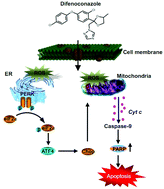The Involvement of ER-stress and ROS Generation in Difenoconazole-Induced Hepatocellular Toxicity
Abstract
Difenoconazole is one of the triazole compounds, and is widely used as an environmental fungicide. Recently, it has been suspected that long-term exposure to difenoconazole through drinking water and food may induce health effects including hepatotoxicity and tumorigenesis. However, there is little information regarding the molecular mechanism of difenoconazole-induced cytotoxicity and/or human health risk. The present study aimed to investigate the toxic effects of difenoconazole on human hepatocellular carcinoma HepG2 cells in terms of cell viability, generation of reactive oxygen species (ROS) and cellular apoptosis. Difenoconazole significantly activated apoptosis related proteins, namely caspase-8 and -9, as well as cleavage of poly-ADP ribose polymerase (PARP) in a dose-dependent manner whereas the IC50 value for difenoconazole was calculated to be 70 μM. Correspondingly, intracellular generation of ROS was also markedly increased after exposure to difenoconazole and was observed to occur specifically in mitochondria and the endoplasmic reticulum (ER), suggesting that mitochondria and the ER are target organelles for difenoconazole-induced cytotoxicity. Moreover, phosphorylation of protein kinase-like endoplasmic reticulum kinase (PERK), followed by initiation of ATF4, phosphorylation of eif2α and activation of Chop were observed to be up-regulated by difenoconazole, indicating that difenoconazole is capable of inducing ER-stress in HepG2 cells. More interestingly, activation of caspase-8, -9 combined with cleavage of PARP and induction of ER-stress can be attenuated by pretreatment with either of the antioxidants N-acetylcysteine (NAC) or lipoic acid (LA), indicating that generation of ROS may result in the induction of apoptosis and cell death probably through an ROS-mediated mitochondria and ER-stress dependent signaling pathway.


 Please wait while we load your content...
Please wait while we load your content...